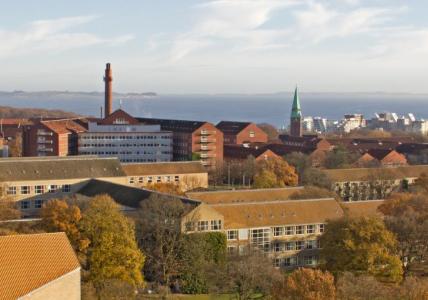How can promoting nature and public health help build climate resilience? Two partners of North Sea Region climate adaptation projects, Egon Baldal and Sofia Aivalioti, provide their reflections from a recent workshop.
On Thursday February 27, the Interreg Atlantic Area project Triple-C organised a networking workshop “Nature and Health Promotion to Face Climate Change.” The event took place in the Portuguese city of Vila Real at the University of Tras-os-montes e Alto-Douro. It was jointly hosted by Professors Dr Ronaldo Eugenio Calcada Dias Gabriel and Dr Jose Manuel Martinho Lourenco.

Natural landscape elements can absorb and buffer torrential rains and high precipitation.
Photo: Building with Nature.
Egon Baldal was invited as a keynote speaker in his capacity as leader of two North Sea Region projects on climate resilience – C5a and Building with Nature. So was Sofia Aivalioti who spoke on behalf of the North Sea Region project BEGIN. The setting was open, allowing students and experts to participate in the workshop and the lively discussions.
The workshop focused on blue and green infrastructure and how to use the insights from this field to address climate change, improve health and build resilience. One of the common denominators is that the outcry for increased transdisciplinary and cross-silo collaboration is coming from different angles including health care, urban planning, water management, civil engineering, economics and sociology.
Egon Baldal presented the Tower of Babel as a metaphor for the need to connect many different disciplines. We need to build the tower together because the “waters around us are rising”; and what we build had better be strong.

A collaborative Tower of Babel. People in different disciplines must innovate together to build climate resilience. Illustration: Rijkswaterstaat.
Building resilience is all about looking into the future, knowing the present and having options available to retain our current level of safety, health and prosperity. Future generations depend on it.
Sofia Aivalioti gave an overview of the different options for using the blue and green infrastructure elements to make cities more liveable and healthier whilst adapting to climate change drawing examples from the project BEGIN.
In BEGIN, this happens collaboratively with the communities and social innovation meaning co-creation is now becoming almost a common strategy for blue and green infrastructure for the 10 pilot cities. Blue and green infrastructure can be specifically designed for health.
A striking example was a dementia-friendly garden that allows people suffering from dementia to experience green landscape elements and bring them memories through aromatherapy techniques. Building for multiple purposes can have positive impact on many different domains, such as healthcare, climate change mitigation, biodiversity and even social cohesion.

Co-creation: Designing public spaces for activities in nature in Enfield, the UK. Photo: BEGIN
Some other highlights from inspiring talks at the workshop:
- Tim Taylor from the University of Exeter presented compelling evidence on the mental health aspects of living near the coast and citizens’ willingness to pay for access to aquatic environments in order to relax. He presented the Bluehealth behavioural assessment tool, which can be used to underpin ecosystem services and health effects as well as public appreciation of these benefits.
- Heliana Teixeira from the University of Aveiro in Portugal made it very explicit how sea level rise affects the Rio de Aveiro Delta. Not only from the geophysical and ecological systemic point of view, but also from the individual and cultural one. With increased salinity a local rice farmer will now be in his last year of farming if no adaptive measures are taken. The resilience parameters of adaptation versus transformation thus became evident in the life of a real person, a bearer of Portuguese gastronomic cultural identity.
The mutual appreciation of different disciplines, the openness and the willingness to learn from one another on the topics of climate adaptation and resilience and to start future cooperation made this an unforgettable day. Many thanks to Triple-C and the Interreg Atlantic Area Programme for this unique opportunity to work together. It was certainly worthwhile for us who represented North Sea Region projects.
Maybe this could lead to a future joint conference, together with the Atlantic Arc Commission and the North Sea Commission?

ABOUT THE AUTHORS
Egon Baldal
Egon works at the Dutch Ministry of Infrastructure and Water Management, DG Rijkswaterstaat, where he leads two Interreg projects on climate adaptation, C5a and Building with Nature. He lives in a peat meadow 1 meter below sea level with his partner and daughters.

Sofia Aivalioti
Sofia is an innovation consultant at Bax & Company. She is specialised in strategising on renaturing urban environments through nature-based solutions and creating healthier and liveable cities.



